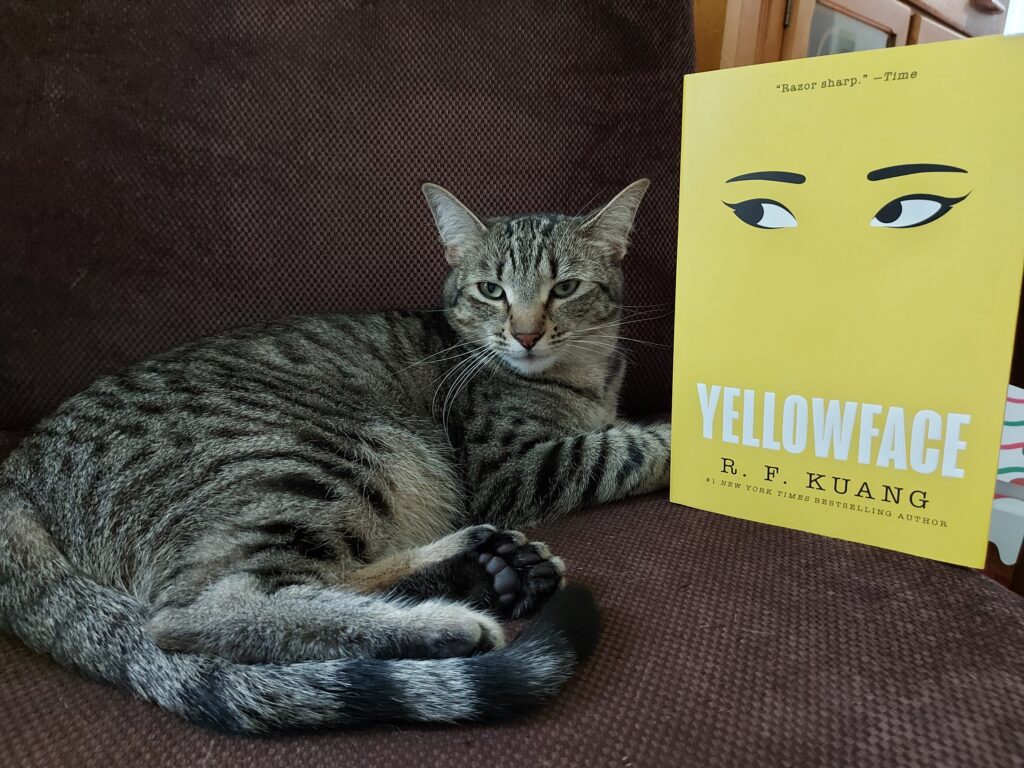Yellowface by R. F. Kuang

Yellowface is quite the divergence from R. F. Kuang’s last novel, Babel. It is a contemporary satire of the publishing industry, which I am surprised even got published. It does not hold back in its criticism of the racism that permeates the industry. Like Birnam Wood, I cannot say that I liked reading Yellowface. The novel’s “protagonist” is just so awful, I was angry the entire time I read it. However, it is a very interesting behind the scenes look at the publishing industry and how successful writers are made.
Yellowface is about a white writer named June Hayward whose debut novel, a YA fantasy, has flopped. When the novel opens, June is celebrating her friend – in the loosest sense of the word – Athena Liu’s Netflix deal. Athena is a Chinese American author who has found great success as a writer, and June is insanely jealous of her. When June witnesses Athena’s death in a freak accident, she steals the first draft of Athena’s latest novel with the intention of passing if off as her own. The novel, called The Last Front, is about the contributions of Chinese labourers during World War I. June, with the help of her publisher, reworks Athena’s draft and Uncle Tom Cabin’s the shit out of it by making the white characters more sympathetic and empathizing the Chinese characters “virtue and honesty”. Her publisher also suggests that June publish The Last Front under her first and middle names – Juniper Song – so that readers are misled into thinking that June is Asian. June herself has author photos taken to make herself look ethnically ambiguous.
The Last Front is, of course, a huge success, propelling June in literary fame and fortune. But then the critics, mainly Asian American readers, start posting about June on social media, criticizing a white woman for writing a racist text about Chinese labourers and accusing her of stealing The Last Front from Athena. The bulk of Yellowface is June doubling down on her lie that she did not plagiarize Athena’s work, justifying her actions for stealing Athena’s work, trying to make herself look like the victim, complaining about “reverse racism” and gleefully watching as her detractors get taken down by other privileged white writers and white supremacists (although, the two are not necessarily mutually exclusive). It is so infuriating to read! The only thing that kept me reading this novel was the hope that June would get her comeuppance.
June also tries to make Athena the villain because Athena was aloof, looked down on other Asian American writers, took her ideas from other people’s experiences and because her writing seemed to reflect racism against her own Chinese culture. June tries to paint Athena as the worst friend, but Athena still comes out as the more sympathetic character when you realize that she has been used as a cultural bridge for white readers to Asian stories and has had her whole career carefully dictated by her publishers who made being Asian her “brand”.
I realize the irony of Yellowface, which criticizes white writers for telling stories that should be told by writers of colour, being written by a Chinese American writer who is writing from the perspective of a white female writer, but June is an amalgamation of all the racism that Kuang has had to dealt with in the publishing industry and from readers, that it works.
The only point of June’s that I will concede is that it is not appropriate to gatekeep what people are allowed to write. But how can a white author authentically write from the perspective of a person of colour when by the very fact of their white privilege they have not experienced racism? How can a white author write without infusing their story with their own unconscious bias and “white gaze”?
I do not expect Yellowface to actually change things in the publishing industry. I think white writers will continue to find greater success while writers of colour will continue to struggle to have their stories published due to diversity quotas. But I hope that Yellowface makes readers evaluate the books they read more critically, as well as the people who write them.